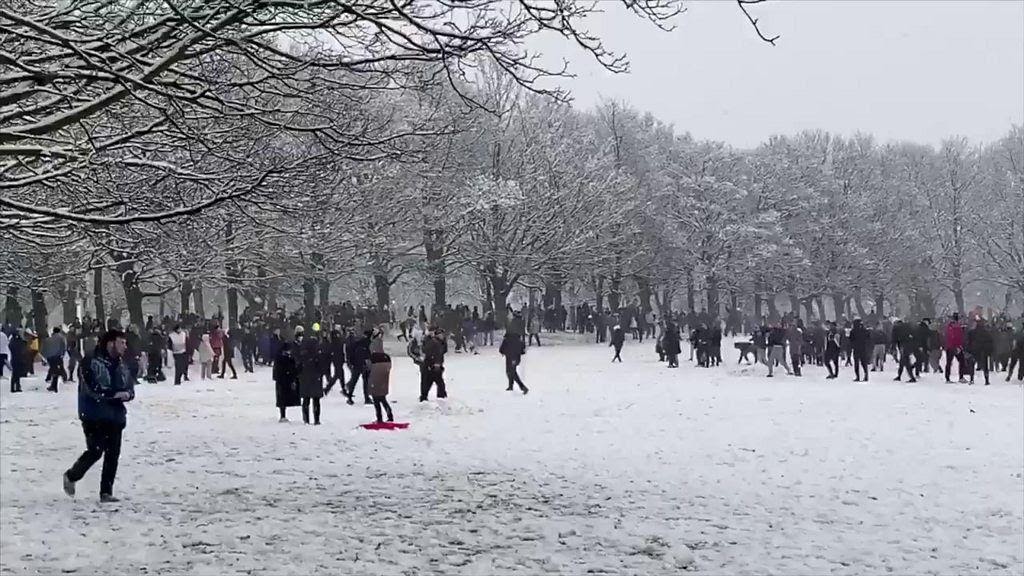The two men who organised a mass snowball fight in Hyde Park attended by hundreds on January 14th have each been fined £10,000 for contravening Coronavirus restrictions. Alongside viral images of Birmingham students hiding in cupboards to evade police raids of house parties, it is clear that the general public are tiring of lockdown, resulting in tensions with the authorities tasked with enforcing Covid rules. In recent weeks, those who feel unfairly targeted by police have gone public, branding the authorities ‘power-hungry’ and ‘intimidating,’ begging the question – is strict police enforcement of Coronavirus restrictions justified, or increasingly veering into overkill?
It should first be considered what powers the police actually have to challenge Covid rule-breakers. A fixed penalty notice, a type of fine used mainly as a punishment for anti-social behaviour, is typically issued to those found in breach of restrictions. These fines are worth a minimum £200 in England and Northern Ireland, and £60 in Wales and Scotland. Fines of up to £10,000 can be issued for the most serious offences – such as the organisers of large parties attended by some students in cities like Nottingham and Sheffield and of the aforementioned Hyde Park snowball fight. Over 42,000 fixed penalty notices have been issued in response to breaches of Coronavirus restrictions since they were introduced in March. Across England, around 250 people have received the maximum fine of £10,000.
In an attempt to further discourage house parties, Home Secretary Priti Patel announced in January that those who organise or attend them would now receive fines of no less than £800. Such a party was shut down in Leeds last Tuesday, and 23 fines of over £1,000 have already been issued throughout the third lockdown.
Newcastle United striker Joelinton was fined £200 last week after posting a photo of himself inside a barbershop that should have been closed, contravening lockdown regulations. His hairdresser, Tom Baxter, had already been warned for breaches of lockdown after cutting the hair of multiple footballers, but argued that he had to ‘make ends meet’ after lockdown scuppered his business.
In recent weeks, police in Leeds have been stepping up measures to bring Covid rule-breakers to justice. The Yorkshire Evening Post reports that an increasing number of cars are being stopped by police in Leeds order to check that the reasons for the passengers’ travel are legitimate. Nearly 60 vehicles were stopped on Carr Road in Calverley over just one weekend in January, although only two fines for lockdown breaches were issued – each worth £100.
It’s pretty common knowledge that you can be reprimanded for leaving your home or garden unless you have a ‘reasonable excuse’ for doing so. Approved activities can include grocery shopping, exercise and commuting to work if it can’t be done from home. However, there have been recent allegations that police have stopped and intimidated civilians acting entirely within the restrictions.
In early January, two women complained that after driving five miles for a walk, they were ‘surrounded’ by police and fined £200 each. Their actions were technically legal, as official guidance states you may go out for exercise with another person from outside your household provided that you do not leave your ‘local area’ and remain distanced from one another. The local force, Derbyshire Police, defended itself by arguing that driving for exercise is ‘not in the spirit’ of lockdown and that since the two had brought warm drinks with them, their walk was ‘classed as a picnic’ and therefore unlawful.
Later in the month, policemen in Solihull were criticised after video emerged of 21-year-old Nino Romano being detained for refusing to provide police officers with his name after previously informing them he was on his way to work. Romano labelled the policemen ‘power-hungry’ and accused them of ‘harassing’ him for no reason. A spokesman for the West Midlands Police concurred that the officers’ behaviour was ‘unacceptable.’ In this case, police conduct also contradicted official government guidance which states that a citizen’s refusal to give officers their name cannot be used as grounds for arrest if there is no other reason to suspect wrongdoing.
In addition, police forces have sometimes been forced to rescind fines later found to have been issued erroneously. A student in Lincoln had his £10,000 fine dropped after it turned out what police believed to be a house party attended by 100 people was actually a number of smaller parties taking place within the same accommodation building.
It can therefore be seen that police officers are not infallible when enforcing Coronavirus regulations. However, some have argued that lockdown restrictions are particularly difficult for authorities to enforce. A joint letter to the government signed by a group of Cheshire police chiefs argued that the ‘ambiguity’ between which Covid rules were formal regulations and which are mere guidelines creates ‘challenges’ for officers on the street and undermines public compliance by creating confusion.
Header image: a snowball fight in Hyde Park that took place in January, for which the organisers have each been fined £10,000 //credit: BBC

